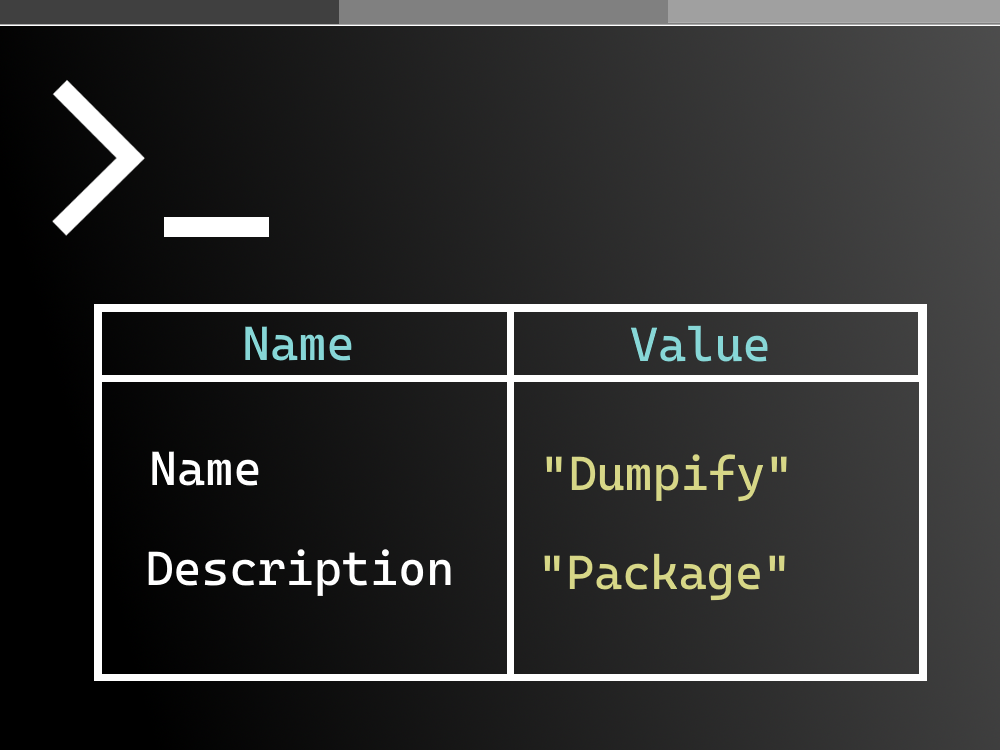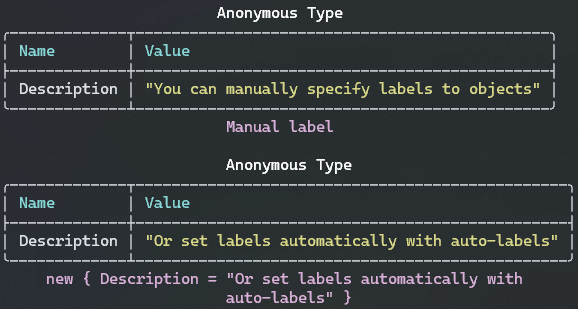Dumpify

Improve productivity and debuggability by adding .Dump() extension methods to Console Applications.
Dump any object in a structured and colorful way into the Console, Trace, Debug events or your own custom output.
How to Install
The library is published as a Nuget
Either run dotnet add package Dumpify, Install-Package Dumpify or use Visual Studio's NuGet Package Manager
Overview Video
An overview video hosted on the Open at Microsoft show
Features
- Dump any object in a structured, colorful way to Console, Debug, Trace or any other custom output
- Support Properties, Fields and non-public members
- Support max nesting levels
- Support circular dependencies and references
- Support styling and customizations
- Highly Configurable
- Support for different output targets: Console, Trace, Debug, Text, Custom
- Fast!
Examples:
Anonymous types
new { Name = "Dumpify", Description = "Dump any object to Console" }.Dump();
Support nesting and circular references
var moaid = new Person { FirstName = "Moaid", LastName = "Hathot", Profession = Profession.Software };
var haneeni = new Person { FirstName = "Haneeni", LastName = "Shibli", Profession = Profession.Health };
moaid.Spouse = haneeni;
haneeni.Spouse = moaid;
moaid.Dump();
//You can define max depth as well, e.g `moaid.Dump(maxDepth: 2)`
Support for Arrays, Dictionaries and Collections
var arr = new[] { 1, 2, 3, 4 }.Dump();
var arr2d = new int[,] { {1, 2}, {3, 4} }.Dump();
new Dictionary<string, string>
{
["Moaid"] = "Hathot",
["Haneeni"] = "Shibli",
["Eren"] = "Yeager",
["Mikasa"] = "Ackerman",
}.Dump();
You can turn on or off fields and private members
public class AdditionValue
{
private readonly int _a;
private readonly int _b;
public AdditionValue(int a, int b)
{
_a = a;
_b = b;
}
private int Value => _a + _b;
}
new AdditionValue(1, 2).Dump(members: new MembersConfig { IncludeFields = true, IncludeNonPublicMembers = true });
You can provide a custom filter to determine if members should be included or not
public class Person
{
public string Name { get; set; }
[JsonIgnore]
public string SensitiveData { get; set; }
}
new Person()
{
Name = "Moaid",
SensitiveData = "We don't want this to show up"
}.Dump(members: new MembersConfig { MemberFilter = member => !member.Info.CustomAttributes.Any(a => a.AttributeType == typeof(JsonIgnoreAttribute)) });You can turn on or off row separators and a type column
//globally
DumpConfig.Default.TableConfig.ShowMemberTypes = true;
DumpConfig.Default.TableConfig.ShowRowSeparators = true;
new { Name = "Dumpify", Description = "Dump any object to Console" }.Dump();
//or Per dump
new { Name = "Dumpify", Description = "Dump any object to Console" }.Dump(tableConfig: new TableConfig { ShowRowSeparators = true, ShowMemberTypes = true });
You can set custom labels or auto-labels
new { Description = "You can manually specify labels to objects" }.Dump("Manual label");
//Set auto-label globally for all dumps if a custom label wasn't provider
DumpConfig.Default.UseAutoLabels = true;
new { Description = "Or set labels automatically with auto-labels" }.Dump();
You can customize colors
var package = new { Name = "Dumpify", Description = "Dump any object to Console" };
package.Dump(colors: ColorConfig.NoColors);
package.Dump(colors: new ColorConfig { PropertyValueColor = new DumpColor(Color.RoyalBlue)});
You can turn on or off type names, headers, lables and much more
var moaid = new Person { FirstName = "Moaid", LastName = "Hathot", Profession = Profession.Software };
var haneeni = new Person { FirstName = "Haneeni", LastName = "Shibli", Profession = Profession.Health };
moaid.Spouse = haneeni;
haneeni.Spouse = moaid;
moaid.Dump(typeNames: new TypeNamingConfig { ShowTypeNames = false }, tableConfig: new TableConfig { ShowTableHeaders = false });
There are multiple output options (Console, Trace, Debug, Text) or provide your own
var package = new { Name = "Dumpify", Description = "Dump any object to Console" };
package.Dump(); //Similar to `package.DumpConsole()` and `package.Dump(output: Outputs.Console))`
package.DumpDebug(); //Dump to Visual Studio's Debug source
package.DumpTrace(); //Dump to Trace
var text = package.DumpText(); //The table in a text format
using var writer = new StringWriter();
package.Dump(output: new DumpOutput(writer)); //Custom outputEvery configuration can be defined per-Dump or globally for all Dumps, e.g:
DumpConfig.Default.TypeNamingConfig.UseAliases = true;
DumpConfig.Default.TypeNamingConfig.ShowTypeNames = false;
DumpConfig.Default.ColorConfig.TypeNameColor = Color.Gold;
DumpConfig.Default.MaxDepth = 3;
//Much more...Features for the future 0.7.0 release
- Add configuration for formatting Anonymous Objects type names
- Text renderer
- Better rendering of Delegates
- Write the
Countvalues of dictionaries and IEnumerables in the name, e.gDictionary<string, string>(3) - Add an option to limit how many elements to render for collections and arrays.
- consider changing the default color scheme to VSCode's
- Documentation
- Consider changing the style/view of ObjectDescriptors without properties (currently empty table)
- Fix simplified type names with Collection expressions (IEnumearble
col = [1, 2, 3]);
To do
- Live outputs
- Add custom rendering for more types:
- Exceptions, AggregateExceptions, etc...
- Rethink Generators caching keys
- Ditch
ObjectIdGeneratorand create a custom, modern implementation - Consider using Max Depth for Descriptors
- Refactor Renderers and make it better extendable
- Add more renderers
- Text Renderers
- re-introduce Json
- CSharp Renderer
- Consider Decoupling from Spectre.Console
- Tests
- More tests
- Visual (Render) Tests - consider acceptance tests
- Tests for Nesting
- More sync between Custom Descriptors and Custom Renderers
- Think how we can mark type's descriptor as needing special rendering.
- The current CustomDescriptorGenerator must generate a value
- Consider ValueTuple
- Refactor SpectureTableRenderer to share customization code


